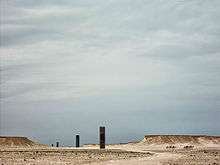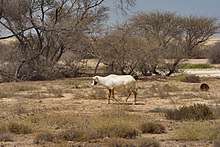Zekreet Peninsula
The Zekreet Peninsula, also known as the Abrouq Peninsula, is a peninsula in western Qatar, located to the north of the industrial city of Dukhan. Much of the area is associated with erosional landforms such as foothills, mesas and gypsum plateaux.[1] The village of Zekreet, the Zekreet Film City, and the headland of Ras Abrouq (which includes a nature reserve for wild deer)[2] are all found on this stretch of land.[3] The peninsula is part of the Al Reem Biosphere Reserve.[4]

Geography
One of its defining features is the Bay of Zekreet, which is shaped like a half-moon.[3]
Geology

The Abarug Member of the Eocene-period Dammam Formation is the dominant structural-lithic unit of the area. The uppermost part of the Abarug Member is formed of dull-colored slightly calcareous dolomitic limestone and is roughly 2 m thick, while the lower part is approximately 10 m thick and comprises brightly-colored slightly calcareous dolomitic marl.[5]
Wildlife
Common ostriches, wild deer and gazelles occur in the peninsula.[6] The Ministry of Municipality and Environment advises tourists not to visit during the ostrich breeding season due to their aggressive tendencies.[7]
Flamingos are commonly found near the Bay of Zekreet.[8]
The peninsula is a popular destination for foreign tourists due to its unspoiled beaches and limestone rock formations. Visitors frequently camp here overnight.[2] However, some of the natural geography has suffered as a result of litter left behind, damage to the vegetation and damage to the land caused by tourists.[9]
References
- M. Richtzenhain, A. Al-Jaberi, B. Böer, M. Breulmann, F. Darwish, R. Dowling, J. Grainger, O. Llewellyn, K. Muhannadi, N. Pilcher, H. Schwarze, C. Southgate & M. Sutcliffe (2008). "Towards Environmentally Friendly Tourism in Arabian Biosphere Reserves; Case Study: Al Reem, Qatar". UNESCO Doha Office. p. 21. Retrieved 22 February 2019.CS1 maint: uses authors parameter (link)
- "Ras Abrouq Rock Formations". National Tourism Council (Qatar). Retrieved 22 February 2019.
- "معالم (Landmarks)" (in Arabic). Ministry of Interior (Qatar). Retrieved 22 February 2019.
- "Biosphere Reserve Information: Al Reem". UNESCO - MAB Biosphere Reserves Directory. Retrieved 22 February 2019.
- Jacques Leblanc (March 2008). "A Fossil Hunting Guide To the Tertiary Formations of Qatar, Middle East". academia.edu. p. 23. Retrieved 22 February 2019.
- "Ras Abrouq Ramble". Qatar Natural History Group. 9 December 2009. Archived from the original on 31 January 2019.
- "Zekreet Beach". Online Qatar. Retrieved 22 February 2019.
- "The Road to Bir Zekreet". Marhaba Qatar. 9 August 2017. Retrieved 22 February 2019.
- Paul Sillitoe (1 August 2014). "Sustainable Development: An Appraisal from the Gulf Region". Berghahn Books. p. 261.